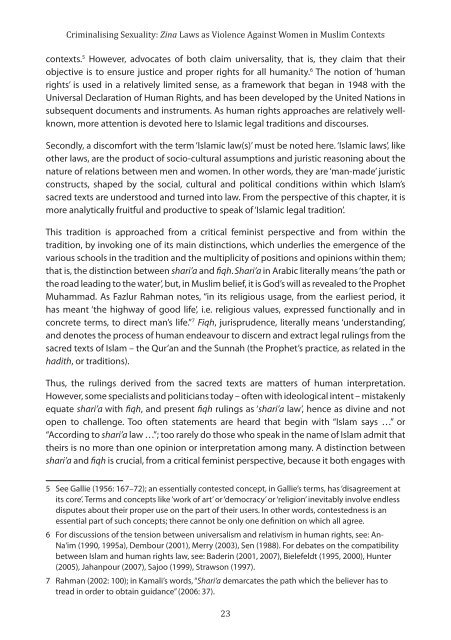control and sexuality
control and sexuality
control and sexuality
- No tags were found...
Create successful ePaper yourself
Turn your PDF publications into a flip-book with our unique Google optimized e-Paper software.
Criminalising Sexuality: Zina Laws as Violence Against Women in Muslim Contextscontexts. 5 However, advocates of both claim universality, that is, they claim that theirobjective is to ensure justice <strong>and</strong> proper rights for all humanity. 6 The notion of ‘humanrights’ is used in a relatively limited sense, as a framework that began in 1948 with theUniversal Declaration of Human Rights, <strong>and</strong> has been developed by the United Nations insubsequent documents <strong>and</strong> instruments. As human rights approaches are relatively wellknown,more attention is devoted here to Islamic legal traditions <strong>and</strong> discourses.Secondly, a discomfort with the term ‘Islamic law(s)’ must be noted here. ‘Islamic laws’, likeother laws, are the product of socio-cultural assumptions <strong>and</strong> juristic reasoning about thenature of relations between men <strong>and</strong> women. In other words, they are ‘man-made’ juristicconstructs, shaped by the social, cultural <strong>and</strong> political conditions within which Islam’ssacred texts are understood <strong>and</strong> turned into law. From the perspective of this chapter, it ismore analytically fruitful <strong>and</strong> productive to speak of ‘Islamic legal tradition’.This tradition is approached from a critical feminist perspective <strong>and</strong> from within thetradition, by invoking one of its main distinctions, which underlies the emergence of thevarious schools in the tradition <strong>and</strong> the multiplicity of positions <strong>and</strong> opinions within them;that is, the distinction between shari’a <strong>and</strong> fiqh. Shari’a in Arabic literally means ‘the path orthe road leading to the water’, but, in Muslim belief, it is God’s will as revealed to the ProphetMuhammad. As Fazlur Rahman notes, “in its religious usage, from the earliest period, ithas meant ‘the highway of good life’, i.e. religious values, expressed functionally <strong>and</strong> inconcrete terms, to direct man’s life.” 7 Fiqh, jurisprudence, literally means ‘underst<strong>and</strong>ing’,<strong>and</strong> denotes the process of human endeavour to discern <strong>and</strong> extract legal rulings from thesacred texts of Islam – the Qur’an <strong>and</strong> the Sunnah (the Prophet’s practice, as related in thehadith, or traditions).Thus, the rulings derived from the sacred texts are matters of human interpretation.However, some specialists <strong>and</strong> politicians today – often with ideological intent – mistakenlyequate shari’a with fiqh, <strong>and</strong> present fiqh rulings as ‘shari’a law’, hence as divine <strong>and</strong> notopen to challenge. Too often statements are heard that begin with “Islam says …” or“According to shari’a law …”; too rarely do those who speak in the name of Islam admit thattheirs is no more than one opinion or interpretation among many. A distinction betweenshari’a <strong>and</strong> fiqh is crucial, from a critical feminist perspective, because it both engages with5 See Gallie (1956: 167–72); an essentially contested concept, in Gallie’s terms, has ‘disagreement atits core’. Terms <strong>and</strong> concepts like ‘work of art’ or ‘democracy’ or ‘religion’ inevitably involve endlessdisputes about their proper use on the part of their users. In other words, contestedness is anessential part of such concepts; there cannot be only one definition on which all agree.6 For discussions of the tension between universalism <strong>and</strong> relativism in human rights, see: An-Na‘im (1990, 1995a), Dembour (2001), Merry (2003), Sen (1988). For debates on the compatibilitybetween Islam <strong>and</strong> human rights law, see: Baderin (2001, 2007), Bielefeldt (1995, 2000), Hunter(2005), Jahanpour (2007), Sajoo (1999), Strawson (1997).7 Rahman (2002: 100); in Kamali’s words, “Shari‘a demarcates the path which the believer has totread in order to obtain guidance” (2006: 37).23


